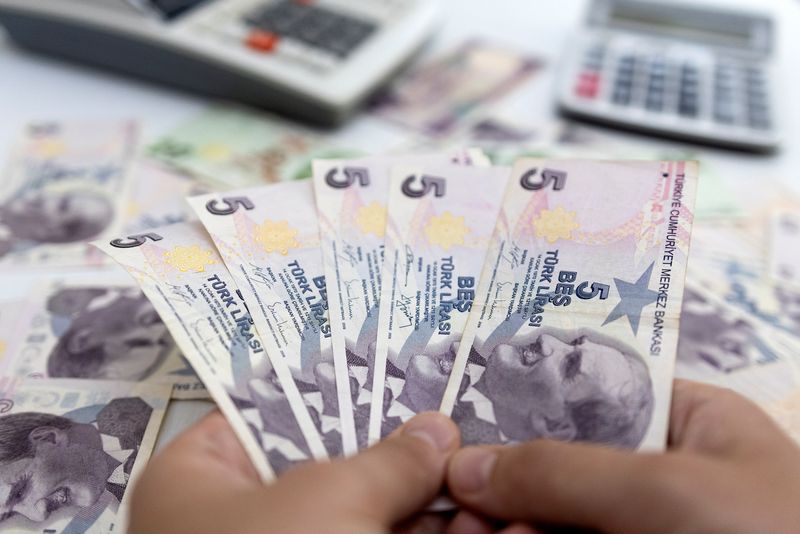By Marc Jones and Canan Sevgili
LONDON (Reuters) -Whisper it, but for all the warnings of a Turkish financial market meltdown if Tayyip Erdogan won May's presidential vote, some parts of it have done rather well, although the lira's drop has been as punishing as predicted, if not worse.
From a stock market rally to one of the worst performing currencies in the world, the charts below show how extreme the moves have been and what investors are watching out for next.
1/HOW LOW CAN YOU GO
The lira has slumped 25% since Erdogan secured his victory and installed new Finance Minister Mehmet Şimşek and central bank chief Hafize Gaye Erkan who seem to have given the currency much more room to do its own thing.
It is down over 30% for 2023 as a whole, pipped only by Nigeria which slashed at the naira with a super-sized devaluation last month and perennial pariah Argentina
The pace of the lira's fall has been accelerating though, meaning it could soon overtake those two unless the tide turns. Many investors think that will only happen if interest rates go to levels just too high for investors to pass up.
Turkey's central bank hiked its main rate by 250 basis points to 17.5% on Thursday. That continued to reverse Erdogan's low-rates policy, but was not as much as some investors had been hoping for considering the inflation problem in the country.
The lira barely budged by its standards.
"You wonder whether they have left it too late" said Mikhail Volodchenko at one of Europe's largest fund managers AXA IM. "You need a lot of things to go right," he added, to avoid some kind of drama.
2/STOCKING UP
The lira may have buckled but Turkey's stock market has soared and not just because of locals piling in to protect their money from a renewed rise in inflation.
Foreign investors scooped up $152.5 million worth of Turkish shares in the week to July 14, according to central bank data, in what was a sixth straight week of buying.
Even more impressive has been the post-election burst of outperformance by MSCI's Turkey index <.dMITR00000PUS>, which is dollar-denominated and therefore accounts for the lira's woes.
"Implementing policies to stabilize the exchange rate, easing inflation concerns and improving economic conditions may positively affect investor confidence and lead to the continuation of optimism," said Enver Erkan, chief economist at Dinamik Yatirim.
3/SPREAD THE LOVE
The switch back towards more orthodox-looking policies has cut the premium, or 'spread' in banker speak, investors demand to buy Turkey's dollar-denominated government bonds rather than the U.S. Treasuries to the lowest since COVID broke out.
That move has meant the bonds have now done better this year than the worldwide benchmark for emerging market debt, the JPMorgan (NYSE:JPM) EMBI Global Diversified index.
There have been other helps too. Erdogan last week unexpectedly gave the green light to Sweden's NATO bid after months of delays.
Just a day later the EU's powerful lending arm, the European Investment bank, which has long had a ban on lending in Turkey, approved a 400 million euros ($448 million) package to help the post-February earthquake rebuild effort.
And on Wednesday Erdogan landed $50 billion worth of deals from the United Arab Emirates on one of his first stops on a tour to wealthy Gulf Arab nations.
"No one is really overweight Turkey," said Simon Lue-Fong, a fixed income head at Swiss-based fund manager Vontobel, referring to investor positioning. "But if it looks like things are changing then it can do well."
Following Thursday rate hike, 5-year credit default swaps, an indicator of the cost of insuring the country's debt against default, dropped again.
4/LOCAL PROBLEMS
In contrast to the dollar bonds, Turkey's 'local' lira-denominated bonds have had a shocker.
The mix of higher interest rates and the lira's collapse means they have lost a whopping 38% in dollar terms versus an 11% gain on the world's main local currency debt index, the JPMorgan GBI EM.
Even if the lira is taken out of the equation the bonds are still down around 13% since Erdogan's election win.
"It is the only local market in world where both the bonds and the currency are weaker this year," said Aegon (NYSE:AEG) Asset Management's head of emerging market debt Jeff Grills.
5/INFLATION PALPITATIONS
One of the big grumbles investors have is that Turkey is in a cycle where high inflation hits the currency which then raises the price of importing everything from food to fuel.
Analysts forecast headline inflation will now stay above 40% for another year and Michael Metcalfe at State Street (NYSE:STT) Global Markets says prices scraped off the internet in real time already show it is going up again.

"This likely reflects a direct response to the collapse in the Lira in the past two-months," Metcalfe said, adding the data pointed to a sharp reacceleration of the monthly inflation rate to back above 4%.
($1 = 0.8920 euros)